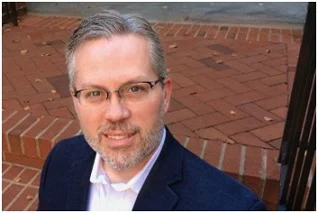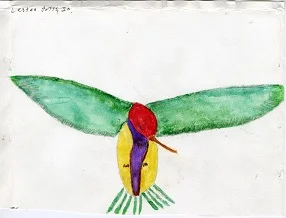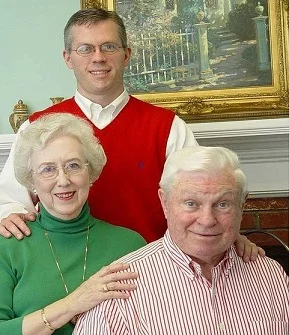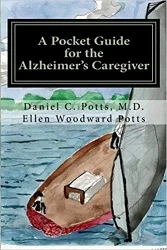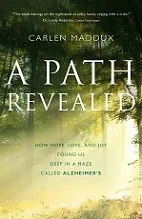“I felt all sorts of guilt and shame the day I realized Dad might have Alzheimer’s,” says Dr. Daniel C. Potts, a practicing neurologist. “The signs had been there, but I hadn’t recognized them.”
It all came to a head in one of the “most important days in our family’s life.” Dr. Potts had welcomed his parents’ move from his small hometown of Aliceville, AL, to Tuscaloosa where he’d set up practice. His retired father, Lester Potts, took a job parking cars in a hospital garage near Dr. Potts’s medical office. “Unbeknownst to me, Dad was having trouble with losing keys, fender benders, and the like. An acquaintance working for the hospital called me and asked if I were aware of what’s going on with Dad.”
“‘I think maybe your Dad has Alzheimer’s,’ she told me.” His father lost his job that very day. “I saw this oak tree of a man cry and begin to die. After my father’s diagnosis, I found myself struggling in a dark place, and I felt myself begin to die, too.” That was 2002; his father was 74 and Dr. Potts, an only child, was 36.
Dr. Daniel C. Potts—neurologist, caregiver, advocate
Warning signs had cropped up a few years earlier in Aliceville. Lester had worked as a saw-miller in rural Alabama among other jobs. He also was deeply involved in his civic club, in church, and in the community, even serving on the town council. His wife was the town librarian. One of the earliest warning signs occurred at their church: First United Methodist had a lovely magnolia tree cut down because it was dying. “Dad was really angry when he saw the tree gone; he didn’t understand why. So he called every church leader and blessed them out. That was so unlike him.”
Lester Potts before his diagnosis
Lester was a physically strong man, and following his diagnosis his behavior became so erratic and aggressive at times that his wife couldn’t care for him. Dr. Potts and his mother finally enrolled him in the Caring Days adult center in Tuscaloosa. “It’s a wonderful place. Their staff embraced Dad and focused on discovering his ‘personhood.’”
Not long before Lester’s enrollment, Caring Days had enlisted a retired artist, George Parker, to start an art program for their clients. Lester was one of the first to participate. “Dad was very capable with his hands; he could do and fix almost anything, but he’d never painted before and shown no talent for it.”
“Then when Dad brought home his first painting, ‘The Little Hummingbird,’ Mom and I were amazed. It was an important day for us all. In that little hummingbird, we saw Dad’s spirit soaring out of his darkness.”
Over the course of three years, Lester painted about 100 pieces, many of which you can see on Lester’s Legacy website.
‘The Blue Collage’ shown above is his most well known piece, says Dr. Potts. “It was painted near the end, when Dad couldn’t put a sentence together. The painting is an abstract representation of my father’s father—a high-topped shoe, a cross coming out of the shoe with a hat on it, and an upside-down crosscut saw. All images that would have defined my grandfather, who was a strong figure in Dad’s life. The colors are warm and hopeful. The painting is very spiritual to me—it says so much more than I can think or say.”
“As Dad’s interest in art grew, he got better—his behavior was better and he was more communicative. I also think that cognitively Dad got better as well. His creativity was transformative not only for him but for all those around him. It seemed that the spirit of the very one with the disease was lifting the spirits of us all.”
Dr. Potts, his mother Ethelda, and father Lester
After seeing art’s impact on his father, Dr. Potts surprisingly started to write poetry. Surprising to both him and his wife. “I woke up in the early morning on New Year’s Day 2006 and wrote a poem. I showed it to Ellen, who said, ‘Where did that come from?’ And for the next 30 days, I did the same thing, waking up early and writing a poem. With dark circles forming under my eyes, I started to look like Jack Nicholson in ‘The Shining.’ I’d never written before.”
“Poetry lifted me out of my funk. It’s now my most important outlet, along with hiking. And this came from the heart of a man with Alzheimer’s disease.” In time, Dr. Potts published a book titled The Broken Jar, which is comprised of 30 pieces of his father’s art and 30 of his poems, one alternating after the other. His poetry can be found on his website The Wooded Path.
“Writing helped me immensely as Dad’s condition progressed, and seemed to give meaning to what was happening. In my writing, I often attempt to place myself in the shoes of the person with dementia and speak in what I perceive to be their voice. I truly feel that writing has made me a better physician; I’m a better listener, because I’ve learned to listen to the deepest parts of myself.”
Dr. Potts sums up his thoughts: “Mostly what I feel when I write is gratitude for the opportunity we were given to see Dad’s spirit soar because someone cared enough to believe that he was still present, that his soul still sang despite the disease.”
Listening to Dr. Potts share such experiences prompts several more questions…
Me: You now travel and speak nationally as an advocate for those living with Alzheimer’s or dementia and for their family caregivers. Did you before your father’s diagnosis?
Dr. Potts: No.
Note: Dr. Potts’ dementia advocacy work has not gone unnoticed. The American Academy of Neurology honored him in 2008 as its Advocate of the Year for his work using the arts to improve the quality of life for those with dementia and their care partners. In 2016, he was honored by the University of Alabama Medical Alumni Association for its Martha Myers Role Model Award, honoring those who epitomize the ideal of service to their communities. “These are the two honors I’m most thankful for in my career,” he says. “They are the result of my experience with Dad.”
CM: Are you doing anything differently with your dementia and Alzheimer’s patients from before your father’s crisis?
DP: My approach is completely different. I like to think I always had empathy and compassion. And I’ve always tried to diagnose as early and clearly as possible. But now I also work with my patients and their families to figure out ways to help them live well with this disease. I line them up with the resources they need—reading materials, support groups, day care facilities, in-home care, and the like. I also encourage the families to look for things their loved ones can still do well.
All this came out of our experience with Dad. When he was diagnosed, I didn’t know where to turn. As strange as it may seem, caregiving skills were not taught in medical school or in residency. The thorough knowledge I received of the pathology and clinical manifestations of Alzheimer’s was not helping in the day-to-day challenges facing my mother, Dad’s primary caregiver. I didn’t know enough to help.
Since Dad’s death, my wife Ellen and I wrote A Pocket Guide for the Alzheimer’s Caregiver. (More on their book later.)
CM: Are you seeing any improvement in the training of neurologists from when you were in school—from a caregiving perspective?
DP: No. Or very little. I attended a Dementia Action Alliance meeting. A panel of persons living with various forms of dementia was asked to raise their hands if their doctor offered helpful information and direction after telling them of their diagnosis. Not one hand went up. Some of the words used to describe their doctors were “cold,” “analytical,” “distant,” “abrupt.”
Since that meeting, I’ve started advocating for the ways we neurologists are trained. I think the tide may be changing somewhat. I hope it is.
CM: Your father died at age 78 in 2007, five to six years after his diagnosis. You were 41. How did you handle that?
DP: After Dad died I burned out; it had been building for some time. I disintegrated into addiction, isolation, depression, and grief. It all came to a head nearly six years ago when I had to take a four-month medical leave from the practice of medicine.
A centerpiece of my recovery has been the teachings of Richard Rohr (a Franciscan priest). I first read his book Falling Upward: A Spirituality for the Two Halves of Life, and since then read many others. I also read his daily online homilies, and I’ve visited his center in New Mexico a couple of times.
(Father Richard Rohr founded the Center for Action and Contemplation (CAC) in Albuquerque in 1986. He’s an internationally recognized ecumenical teacher who’s written numerous books on spirituality, meditation, and commitment to action within the Franciscan Christian tradition.)
In addition to Rohr’s teachings, my family’s love and support—along with that of my friends, therapists, and church and support group members—did for me what I now advocate doing for those living with dementia: They helped lead me back to me.
CM: Of what value are Rohr’s teachings to your practice and involvements today?
DP: I’m now what you might call a “mindfulness practitioner.” What I’m learning about listening at another level has found its way into my practice and into the way I interact with people. I teach on subjects using the expressive arts and storytelling to improve the quality of life in those living with Alzheimer’s and other dementias. I also teach an undergraduate course, “Bringing Art to Life”, at the University of Alabama Honors College that includes many students entering pre-med, nursing, and other health-related professions. I pour a lot or Rohr’s teachings into all these.
CM: You started a foundation in memory of your father. Tell us about that.
DP: It’s called Cognitive Dynamics: Bringing Art to Life—Word, Drama, Art, Music. Our mission as shown on the website is “to improve the life of persons with cognitive disorders and their caregivers through education, research, and support of innovative care models which promote human dignity, especially therapies employing expressive arts and storytelling.”
Often medical research is performed for the sake of science, without a clear goal of improving the perceived quality of life. This traditional approach to research is important, but we also see a tremendous opportunity to improve the lives of those living with dementia and their families through alternative approaches to research.
(The foundation’s work is financed through grants, individual donations, and the sale of copies of Lester Potts’s paintings.)
CM: One final question, though not a simple one. What advice would you give to someone today who’s recently diagnosed with Alzheimer’s or dementia and to their family?
DP: To the person diagnosed I would say nothing has the power to rob you of yourself. Some people have diabetes. Some have cancer or depression. You have Alzheimer's/dementia. But that does not make you "less than," or less yourself. To the extent that you are able, celebrate your life daily, and the lives of those whom you love and who love you. Do things that you enjoy doing. Just be yourself. There is nothing to be ashamed of. Laugh. Sing. Pray.
To the family: Learn as much as you can about the diagnosis, and promptly begin to make plans for the future. Do not give up on your loved one. Honor their personhood, and help them daily to express themselves. Remember the things that make them who they are, and support those. Do not hold them accountable to be what your ego needs them to be. They are who they are. Join them in their world. Celebrate the uplifts, the small gifts—a look of recognition, a shared special moment, a new talent discovered. Learn not only to give, but also to receive and draw energy from your loved one's spirit. Have no resentments, judgments, or regrets. Make a gratitude list. Sleep. Take care of your own needs without guilt. Ask for help from family and friends. Maintain your friendships and other social involvements. Pray.
From my experience with Dad I know that much of this is easier to describe than immediately to do. But working on and growing into these traits is worth the time, focus, and energy—for you and for your loved one.
CM: Thank you, Dr. Potts, for sharing your family’s story and your insights.
**********************
On occasion, I give a book away. It seems appropriate to do so with A Pocket Guide for the Alzheimer’s Caregiver, co-authored by Dr. Potts and his wife Ellen, whose maternal grandfather and paternal grandmother lived with Alzheimer’s disease. She has over 20 years of experience in healthcare management and teaches at the University of Alabama in addition to being the executive director of Tuscaloosa’s Habitat for Humanity.
Their book is practical and straightforward with chapters short and to the point. Here are a few of the 34 chapter titles: A Word about Caregiving; False Accusations; Inappropriate Public Behavior; Clothing; Dressing/Bathroom Issues; Eating Issues; Wandering; Walking and Balance Problems. The cover is a Lester Potts painting.
If you’d like to put your name into the hat for this book’s giveaway, here’s how:
Anyone is eligible, whether you subscribe to my newsletter or not. Simply send an email to carlen@carlenmaddux.com between this Wednesday, October 24, and Friday, October 26, by 12:00 Midnight EDT. Indicate that you would like to be included in the drawing and put in the subject line: BOOK GIVEAWAY.
One person will be selected at random from those entering. I’ll send you a congratulatory email. You will have 48 hours to respond to my email. If I don’t hear back from you by then, someone else will be selected at random. For more details, click Book Giveaway.
Thanks,
Carlen Maddux
www.carlenmaddux.com
carlen@carlenmaddux.com
PS1 I share in my book our family’s 17-year experience of living with Alzheimer’s. My high-energy wife Martha was 50 when diagnosed, I was 52. Our children were in high school and college. Alzheimer’s is not the focus of our story; it’s the context. The focus is the spiritual odyssey that unfolded through this time. The book is titled A Path Revealed: How Hope, Love, and Joy Found Us Deep in a Maze Called Alzheimer’s. It can be ordered from any bookstore or found on Amazon.
PS2 As usual, feel free to forward this post to your friends and family. If you’d like to sign up for my blog, it’s free; just click here.
PS3 I’m sticking this 65-cent Alzheimer’s fundraising stamp on all my mail. It was introduced Nov. 30, 2017. More than 4.5 million stamps have been sold through its first ten months to raise $626,000 for Alzheimer’s research; the net proceeds go to the National Institutes of Health. Join me and thousands of others to Help Stamp Out Alzheimer’s.
